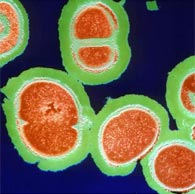Sexually active gay men in San Francisco were 13 times as likely to contract methicillin- resistant staphylococcus aureus, or MRSA, than their heterosexual counterparts, said researchers at the University of California at San Francisco.

Magnified image of a cluster of drug-resistant staphylococcus aureus bacteria. To dilute the concentration of bacteria, researchers suggest taking a shower after sexual contact and the use of regular soap.
Researchers have found that the new strain of bacteria called USA300 is growing resistant - or unresponsive - to three or even four classes of widely used antibiotics.
The study - published online in the Annals of Internal Medicine - warned that the new strain which seems to have "spread rapidly" in gay populations in San Francisco and Boston, "has the potential for rapid, nationwide dissemination" among gay men.
The bacteria, which typically produces boils that can grow to the size of tennis balls, can lead to sepsis (blood poisoning) or a deadly flesh eating form of pneumonia that devours the lungs in severe cases.
Researchers estimate that about 30 percent of all people carry ordinary staph chronically and most of those who do carry it in their noses or may manifests as an abscess or cellulitis in the buttocks, genitals and anal area.
Staph infections often look like raised red dots on the skin. Left untreated, the areas can swell and fill with pus.
"Once this reaches the general population, it will be truly unstoppable," said Binh Diep, a researcher at the University of California, San Francisco who led the study. "That's why we're trying to spread the message of prevention."
And prevention could just be as simple as soap and water.
"Taking a shower after sexual contact may minimise contamination," says Dr Chip Chambers, co-author of the study and director of infectious diseases at San Francisco General.
"Ordinary soap will do. It dilutes the concentration of bacteria. You don't need antibacterial soap."
Previously, MRSA infections have been documented in sports teams, prison populations, gym-goers and the community at large.
In December last year, a infectious disease expert in Hong Kong warned that visiting massage parlours or having facials may increase one's chances of contracting MRSA.
Even though the Department of Health conceded that there was insufficient scientific evidence to show a link between infections and massage parlours, the warning came after a finding that 10 percent of patients infected with MRSA in 2007 had visited massage parlours within 12 months of the onset of symptoms.
According to the health department, the number of reported community- associated cases jumped from 32 in 2006 to 175 in 2007, with two deaths.
The Centers for Disease Control and Prevention estimated that in 2005 some 94,000 people in the US became infected with MRSA, of which some 19,000 succumbed to it.
